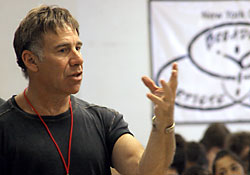This changes everything.
There comes a moment in the musical I’m writing where characters say “this changes everything” and it’s a big deal. 75 years ago on this day, a revolutionary piece called Oklahoma! changed everything in the American theatre. From that day forward, musicals had to do at least some of the things Oklahoma! did. Anything that was written prior now seemed hopelessly old-fashioned. I ask you: When, in the history of stage performances has there ever been such a game-changer?
As 75 years have passed, some consider Oklahoma! old-fashioned. But you know what’s much more old-fashioned? Every Broadway musical that premiered before it. So, let’s imagine what Broadway was like pre-Oklahoma! Generally, you went to musicals to have a few laughs, hear some good tunes. Nothing wrong with that. I confess, with no embarrassment, I enjoy those old musical comedies. Now think about a good straight play. No tunes to enjoy. Instead, you watch characters interact, and you get emotionally invested in what happens to them. Each is distinct. The plot probably gets you wondering what will happen next, at points. A good play is moving, in part, because the characters feel so real to the viewer. None of these virtues regularly applied to musicals that came out more than 75 years ago. The characters weren’t fully drawn, with distinct voices, interacting in a way that made you care what happened to them. Sure, now and then they might have had a moving song, and certainly stars of the era like Jimmy Durante and Ethel Merman were idiosyncratic characters. But, in the minds of the creators, musical plots never needed to make you wonder what would happen next, because the real purpose of the show was to provide a platform for the songs the tunesmiths hoped would be hits.
In the decade leading up to Oklahoma!, no composer was more successful at churning out those hits than Richard Rodgers. He and collaborator Lorenz Hart had burst on the scene in 1925 with a revue to raise funds for the Theatre Guild. The Theatre Guild, back then, was a high-minded producing office that promoted the best in world dramatic literature: they did Strindberg, Ibsen and Shaw; here, in America, they found a young phenom named Eugene O’Neill. So, those expectations we have of a good play were generated, in part, by these master producers. But, in 1943, they’d fallen on hard times and wondered if anything could be done with a script they’d bombed with some seasons earlier, Green Grown the Lilacs by a man named Lynn Riggs. They called Rodgers to urge him to make a musical out of it. Hart understandably rejected the idea, since he gravitated towards sophistication, and, in the final year of his life, a lot of cocktails. So Rodgers then called Oscar Hammerstein, who’d churned out nothing but bombs throughout this period. Back in 1927, Hammerstein had done something extraordinary with Show Boat, which embodied many of the dramatic virtues I described in the last paragraph. (I refer to Show Boat as the spark that didn’t light the kindling, as similar shows did not follow in its wake.) The producers and this newly minted team had an exciting idea in mind: to create a musical play. The story could be light, but the dramaturgy would be taken as seriously as it is in any serious drama. Actions would be fully motivated. The psychological make-up of all major characters would be dealt with. One example: the sexual subconscious of the heroine would be depicted in a dream ballet choreographed by Agnes DeMille.
DeMille was famous at the time for the Wild West ballets she’d created with composer Aaron Copland. Listening to Rodeo and Billy the Kid (as I often do), one discovers an analog to the propulsive forward thrust of galloping horses. In Oklahoma!, Rodgers latched on to some similar ideas. Think of the vamps under I Cain’t Say No and The Farmer and the Cowman, the shuffles under All or Nothing or the country fiddle zipping along in the overture. The point here isn’t that Rodgers was derivative of Copland, it’s that he took seriously the idea that his music should depict the story’s time and place. Those wonderful hit-filled scores he’d done previously with Hart lack this verisimilitude. I imagine he didn’t care about such things, but now, working on this musical play, he prioritized telling the story, rather than generating radio hits.
The first essay I can remember writing about musical theatre detailed Rodgers’ transformation from a jazzy chart-topper to dramatic storyteller. But equally remarkable was Hammerstein’s evolution into the greatest dramatist of the time. Those who think of Oklahoma! as fluff may have forgotten it concerns a class conflict involving a laborer who literally lives below the ground, an Arab immigrant who sells hallucinogenic drugs to a virgin (causing her to have a sex-dream we see), men sharing porn and a connected threat that a rival will be knifed in the eyeball, a murder trial that must be done precisely according to statute or the territory won’t be granted statehood, and a fiancé who so doubts his bride’s fidelity he makes her swear their future children will look like him. Fluff, it’s not, although Rodgers and Hammerstein tackled more serious stuff in their next four shows: Carousel, Allegro, South Pacific, and The King and I.
And when other writers tackled tough subjects – West Side Story and Cabaret come quickly to mind – it’s because Oklahoma! opened the door. All great musicals follow in its footsteps, with a seriousness of purpose, with ample thought to the psychological underpinnings of character actions, with music that effectively depicts the setting. Oklahoma! may not be my favorite musical. It may not be yours. But chances are our favorites never would have existed were it not for the myriad innovations unleashed 75 years ago today.



 Posted by Noel Katz
Posted by Noel Katz 




